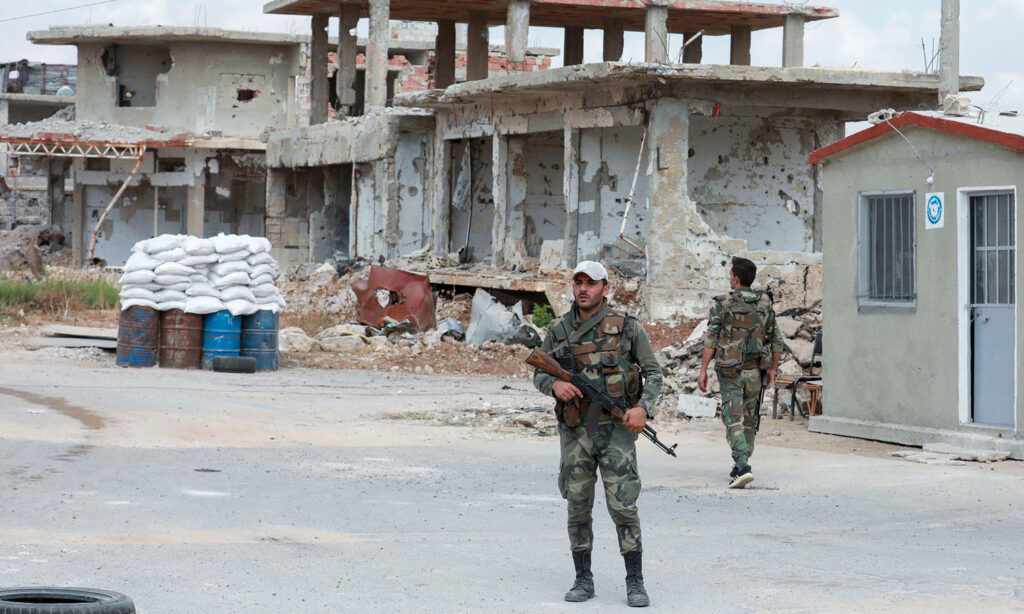Local networks have reported that a checkpoint of regime forces in the vicinity of Damascus arrested about 200 civilians on September 3, after they returned from opposition-controlled areas in northwestern Syria.
Enab Baladi received information about the incident from four sources: a driver working for a passenger transport company operating between control zones, two activists (one in northern Syria and another in Douma who are aware of the incident), and a relative of one of the detainees who confirmed the incident. His mother was among those detained but was later released. However, he had not been able to speak with her directly until the evening of Friday, September 6, for security reasons.
After cross-referencing what the sources told Enab Baladi, it was found that the detainees were on a trip to visit their relatives in opposition-controlled areas in northwestern Syria.
The number of detainees is about 200 people, including women and children. They were detained at the Baghdad Bridge checkpoint near Damascus. Enab Baladi could not verify whether some of them had been released or the reasons for their detention or the details that occurred during their detention.
Most of the detainees hail from Damascus and its countryside, especially areas of Eastern Ghouta (including Douma, Hamouriyah, Saqba, and Harasta).
Enab Baladi attempted to contact the relatives of the detainees, whether located in opposition-controlled areas or regime-controlled areas, but the families refused to comment on the incident out of fear for their loved ones and hope for their release.
Route across three control zones
The detainees traveled a route passing through three control zones in currently divided Syria: regime-controlled areas in the south, center, and west; opposition-controlled areas in the northwest; and areas controlled by the Syrian Democratic Forces (SDF) in the northeast.
According to sources who spoke to Enab Baladi, the journey started from regime-controlled areas to the city of Manbij in the eastern countryside of Aleppo, which is under SDF control. The travelers then entered opposition-controlled areas through the Aoun al-Dadat crossing.
The route is organized by transport companies between the three control zones, and a trip is scheduled weekly, passing on Tuesdays from both directions.
A company in opposition-controlled areas books transportation for travelers from Damascus to Aleppo (under regime control), then a transport company in SDF-controlled areas takes over the booking and transportation from Aleppo to Manbij. The company in opposition-controlled areas then transports passengers to northwestern Syria.
The company in opposition-controlled areas is responsible for two stages of the journey: booking and coordinating from Damascus to Aleppo, and then from Manbij to opposition-controlled areas. However, in some trips, the company in SDF-controlled areas manages the transport from Damascus to Manbij, after which the company in opposition-controlled areas takes over the transport, and vice versa.
The same procedures apply for the return route.
The SDF is a primary controller of the process, as the names of travelers (heading both ways) are sent by the company in opposition-controlled areas to coordination offices in SDF-controlled areas.
In SDF-controlled areas, the decision on the transport method is made, whether to transport passengers directly to Damascus and vice versa (from Damascus to SDF-controlled areas) or only to Aleppo and vice versa.
What happened during the trip
During the trip that led to the detention, according to a driver working for a company in opposition-controlled areas, passengers traveled to Manbij, from where the company in Manbij transported them to the city of Aleppo.
Then, the passengers boarded six buses from Aleppo to Damascus. At the Baghdad Bridge near the capital, a military checkpoint belonging to the Syrian regime stopped five buses.
The driver speculated that the sixth bus arrived early and therefore was not stopped.
The checkpoint detained the passengers of five buses, but some got off before the checkpoint and were not detained (residents of Damascus countryside towns located before the checkpoint).
The driver noted that some passengers, after reaching Manbij, refused to continue the journey with companies in SDF-controlled areas and traveled on their own to the city of Aleppo. They crossed the Tayha checkpoint between regime and SDF-controlled areas, underwent a security check, arrived in Aleppo, and boarded a bus to Damascus, but they were also detained.
Aoun al-Dadat: A crossing for passengers and oil
The Aoun al-Dadat crossing is used for the entry of oil trucks from SDF-controlled areas to opposition-controlled areas, in addition to passenger crossings.
The crossing was reopened in February 2023, between the Syrian National Army (opposition areas) and SDF-controlled areas. It connects the city of Jarablus under the control of the National Army with the city of Manbij under SDF control in the northeastern countryside of Aleppo.
The Military Police affiliated with the National Army at the time specified several conditions for opening the crossing for the movement of people:
– Secure two guarantors with a local council ID, complete personal information of each guarantor to be recorded, and the military guarantor must hold a military ID, specifying the degree of kinship (father – son – brother – sister – mother – daughter – wife – husband).
– Provide photos of the personal ID and a recent personal photo of the inbound person.
– Specify the visit duration, which is considered “temporary” for one month or “permanent” for more than a month, and (in the permanent case) obtain a document allowing an ID from the local council.
– Sign a pledge not to enter Turkey; in case of violation, a financial fine will be imposed (the amount not specified).
– Males aged 18 to 30 are prohibited from leaving Syrian National Army areas towards SDF and regime-controlled areas.

